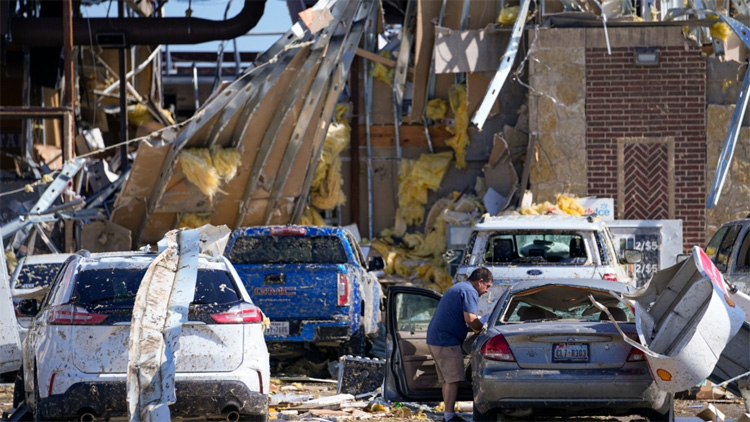At least 15 dead after severe weather carves path of ruin across multiple states in the US South
Powerful storms killed at least 15 people, injured hundreds and left a wide trail of destruction Sunday across Texas, Oklahoma and Arkansas after obliterating homes and destroying a truck stop where dozens sought shelter in a restroom during the latest deadly weather to strike the central U.S.
The storms inflicted their worst damage in a region spanning from north of Dallas to the northwest corner of Arkansas, and the system threatened to bring more violent weather to other parts of the Midwest later in the day. By Monday, forecasters said, the greatest risk would shift to the east, covering a broad swath of the country from Alabama to near New York City.
Storms also killed two people and destroyed houses in Oklahoma, where the injured included guests at an outdoor wedding, five people in Arkansas and one person in Kentucky. Tens of thousands of residents were without power across the region.
In Texas, about 100 people were injured and more than 200 homes and structures destroyed, said Abbott, sitting in front of a ravaged truck stop near the small agricultural community of Valley View. The area was among the hardest-hit, with winds reaching an estimated 135 mph (217 kph), officials said.
“The hopes and dreams of Texas families and small businesses have literally been crushed by storm after storm,” said Abbott, whose state has seen successive bouts of severe weather, including storms that killed eight people in Houston.
Hugo Parra, who lives in Farmers Branch, north of Dallas, said he rode out the storm with 40 to 50 people in the bathroom of the truck stop. The storm sheared the roof and walls off the building, mangling metal beams and leaving battered cars in the parking lot.
“A firefighter came to check on us and he said, ‘You’re very lucky,’” Parra said. “The best way to describe this is the wind tried to rip us out of the bathrooms.”
Multiple people were transported to hospitals by ambulance and helicopter in Denton County, also north of Dallas.
No more deaths are expected and nobody was reported missing in Texas, said Abbott, though responders were doing one more round of searches just in case.
At least five people were killed in Arkansas. One was a 26-year-old woman who was found dead outside a destroyed home in Olvey, a small community in Boone County, according to Daniel Bolen of the county’s emergency management office. One person died in Benton County, and two more bodies were found in Marion County, officials said.
In Oklahoma, two people died in Mayes County, east of Tulsa, officials said.
In Kentucky, a man was killed Sunday in Louisville when a tree fell on him, police said. Louisville Mayor Craig Greenburg confirmed it was a storm-related death on social media.
Seven deaths were reported in Cooke County, Texas, near the Oklahoma border, where a tornado Saturday night plowed through a rural area near a mobile home park, Texas Gov. Greg Abbott said at a news conference Sunday. The dead included two children, ages 2 and 5. Three family members were found dead in one home, according to the county sheriff.
The destruction continued a grim month of deadly severe weather in the nation’s midsection.
Tornadoes in Iowa last week left at least five people dead and dozens injured. The deadly twisters have spawned during a historically bad season for tornadoes, at a time when climate change contributes to the severity of storms around the world. April had the second-highest number of tornadoes on record in the country.
Meteorologists and authorities issued urgent warnings to seek cover as the storms marched across the region late Saturday and into Sunday. “If you are in the path of this storm take cover now!” the National Weather Service office in Norman, Oklahoma, posted on X.
Harold Brooks, a senior scientist at the National Severe Storms Laboratory in Norman, said a persistent pattern of warm, moist air is to blame for the string of tornadoes over the past two months.
Brooks recommended that travelers passing through threatened areas over the Memorial Day weekend have a plan for a weather emergency.
Travelers who have already chosen where to get food and other essentials “probably ought to be thinking about what could I do if there’s a dangerous situation to save my life,” Brooks said.

